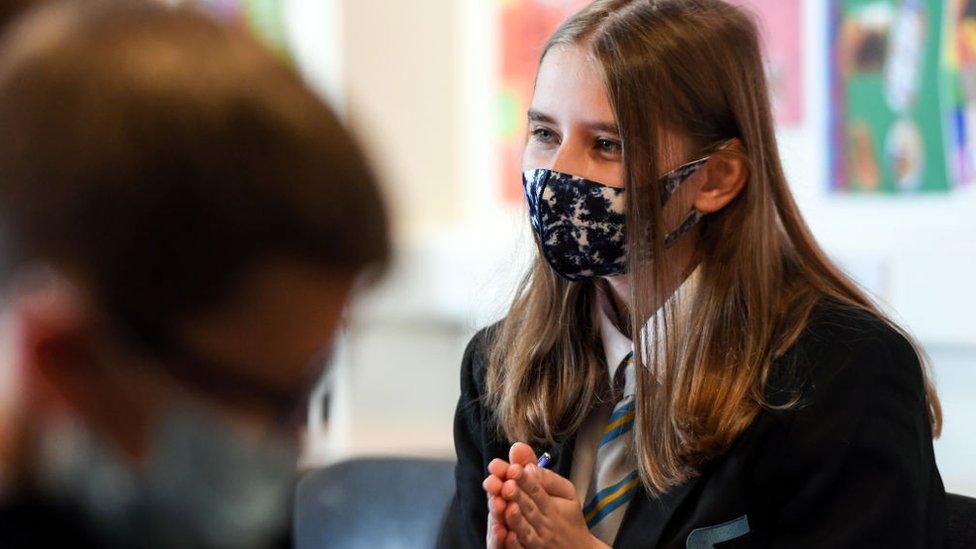Covid in Scotland: Ventilation to curb virus in schools 'unacceptable'
- Published

A teaching organisation has claimed nothing has been done to improve ventilation in classrooms almost two years since the start of the pandemic.
Scottish Teachers for Positive Change and Wellbeing said the issue was first identified in May 2020.
But despite the cold weather schools are still relying on open windows rather than air filtration units.
Education Secretary Shirley-Anne Somerville said the units were not "a substitute for natural ventilation".
In England, Education Secretary Nadhim Zahawi has pledged 7,000 air cleaning units, external for schools and colleges - though there has been criticism it is not enough,
Nuzhat Uthmani, a Glasgow-based primary teacher, told BBC Scotland's The Sunday Show: "It is unacceptable at this point in the pandemic for schools to have to tell their young people at the start of term 'dress warmly'.
"A number of schools have had to say that because windows and doors need to be kept open because we have nothing else."
Ms Uthmani said this was especially true in the primary sector as children are unvaccinated, do not wear masks and do not have to observe social distancing.
She added: "All we have are windows and doors and it is very cold."
'Nothing has happened'
The founder member of Scottish Teachers for Positive Change and Wellbeing said the importance of ventilation in schools was highlighted by the UK's Scientific Advisory Group for Emergencies (SAGE) in May 2020 - two months after the first Covid cases were confirmed in Scotland.
The group, which has about 3,000 members, has written to the Scottish government to highlight its concerns.
She said the group has had little response and "none at all from any government ministers".
"We've had summer 2020, we've had summer 2021, we've had two winters and two periods of long lockdown where all these things could have been put in place," she said.
"Yet nothing has happened to improve ventilation in our schools."
Ms Uthmani added: "We really need to have proper air filtration systems - they can be mobile units, for example."
'Big decision'
Dr Margaret Harris, of the World Health Organization, said the importance of the issue cannot be underestimated.
She told the programme said: "We know the transmission happens in crowds. We know very much it happens when you are in a crowded room, when your space isn't good.
"There is so much we can do to change that, like improving the ventilation.
"I keep banging on about this but that's a big decision people have to make, companies have to make, schools have to make. We have to set up how we live a lot better."
A panel of experts also discussed the issue on The Sunday Show.
Prof Susan Michie said, depending on size, classrooms would need up to three of the portable units, which resemble small fan heaters.
She also highlighted a recent study which found they get rid of most of any coronavirus in the air
And Prof Christine Tait-Burkard described ventilation in many public places as "not adequate".
Expert advice
The education secretary, who also appeared on the programme, said the importance of ventilation was "absolutely recognised".
She added the issue has been the subject of additional funding as part of a package of mitigation measures, which include carbon dioxide monitors.
Ms Somerville said: "I do accept that there are calls from some to move forward with air filtration but I would point to the fact that the Health and Safety Executive themselves do point to the fact that actually aspects like that aren't a substitute for natural ventilation.
"That's why it is important that we absolutely listen to the concerns of our stakeholders but we listen very carefully also to the expert advice which is very much around natural ventilation and the filtrations only being used if nothing else can be done and only in the short term."
Asked about reports of children being asked to wear thermals to school and being "absolutely freezing" in the classroom, the education secretary said learning spaces have to be "safe and adequately heated".
She added any teachers who have concerns should take them up at a local level or with the unions.
Meanwhile, Ms Somerville said the intention at the moment was for exams to take place this year but confirmed contingencies were in place should public health reasons prevent them from going ahead for a third year.
She also told the programme a final decision will be made "at the very latest" by the end of March.

